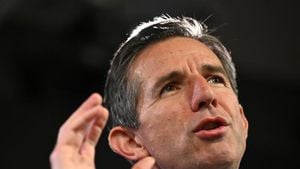Southeast Asia faces unique challenges when it boils down to natural disasters and climate-related adversities, but recent analyses reveal something surprising: the region is also touted as one of the best prepared globally. A new survey by Gallup for the Lloyd's Register Foundation underscores the resilience of its communities.
This region, notorious for its vulnerability to earthquakes, typhoons, and other hazards, shows remarkable confidence when it hits disaster readiness. Benedict Vigers, a research consultant with Gallup, notes, "Frequent exposure to hazard isn’t the only factor determining how prepared people feel."
The analysis hints at effective strategies employed by the Association of Southeast Asian Nations (ASEAN) to bolster disaster management. Widespread early-warning systems, community-based approaches, and strong regional collaboration mark the key to their disaster preparedness.
Over 40% of survey respondents from Southeast Asia reported experiencing natural disasters within the last five years. Notably, 67% therein felt equipped to safeguard their families compared to only 36% from Southern Asia who mirrored similar sentiments.
Interestingly, wealth does not always equate to readiness. Ed Morrow, senior campaigns manager for Lloyd's Register Foundation, pointed out, "Southeast Asia is regionally distinct; it clearly has much to teach the world about preparing for disasters," showcasing how these communities tackle challenges.
The Philippines stood out prominently, where 87% of participants identified as having endured natural disasters, leading the world. This island nation claimed the top ranking for households with disaster plans, closely followed by Vietnam, Cambodia, and Thailand.
Surprisingly, the data were gleaned from the World Risk Poll, comprising over 142 countries, focusing solely on natural hazards and excluding financial or conflict-related disasters. Conducted every two years, the latest results were made public in June.
While it presents a picture of preparedness, the report also highlights the need for enhanced disaster response plans. Turbulent climate changes exacerbate vulnerability, often catching communities off guard.
The situation is dynamic, with natural disasters like floods and droughts contributing to significant disruption. Extreme weather isn’t just physical; it deeply impacts educational and health systems, especially for children.
UNICEF has identified alarming statistics surrounding this issue. Following multiple flood events, around 2.5 million children faced heightened risks pertaining to violence and lack of educational resources.
Yet, challenges persist, and various communities grapple with inadequate disaster preparedness measures, exposing them to major vulnerabilities. The response framework needs to focus on reinforcing family plans amid the mounting risks.
Southeast Asia illustrates the potential of comprehensive disaster management strategies. For individual communities, having clear emergency protocols and welfare plans is more critical than ever.
This proactive engagement can greatly mitigate the devastating impacts of natural occurrences. Now more than ever, investment directed toward sustainable practices and foundational policies is underscored.
Innovative insurance models emerge as solutions warranting attention. With properties becoming increasingly uninsurable, companies are exploring risk-sharing approaches.
For regions where natural disasters are commonplace, features like catastrophe bonds present alternatives. These bonds allow insurers to transfer risks to investors, ensuring communities receive necessary funding contingent on their stability.
For example, exploring parametric insurance could revolutionize how quickly families recover from crises, bypassing cumbersome claim processes. Essential provisions like timely humanitarian aid elicit the minutiae of human aid, covering needs from food and water to educational kits.
Community training programs bolster the pipeline of disaster training, ensuring enhanced preparedness. The emphasis lies not merely on surviving disasters but developing resilience to combat inevitable challenges.
This convergence of community and government efforts builds pathways toward effective disaster management frameworks. Through education and risk management, local adaptations reinforce resilience amid supporting infrastructure.
Certain areas showcase how stringent building codes and recovery protocols create leverage. The outcome leads to improved survival rates during severe weather scenarios.
According to heavyweights such as UNICEF, the focus remains placed upon safeguarding children amid these fluctuated times. This brings forth community-driven policies, pivoting from reactive to proactive appraisal solutions.
Hence, innovative insurance strategies need reinforcement alongside traditional systems. Insurers can capitalize on the growing need for coverage adaptable to environmental shifts.
Child welfare and centering vulnerable demographics compose the contour underpinning comprehensive disaster strategies. These steps will not only safeguard life's sustenance but confront uncertainties arising from climate adversities.
This narrative defines Southeast Asia as bellwether for adaptation against future calamities, establishing groundwork for continuous disaster readiness. The shift toward integrated frameworks fosters enhancing health, education, and livelihood opportunities as preparations evolve.



